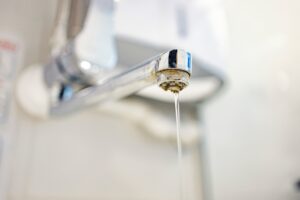Officials from the EPA, the City of Detroit, and the Detroit Water & Sewage Department (DWSD) gathered on August 9 to celebrate the city’s progress in removing lead from its drinking water.
“Since 2022, Detroit has received $90 million in federal funding to help replace lead pipes, including $85 million distributed by the Michigan Department of Environment, Great Lakes & Energy (EGLE), and a $5 million EPA grant awarded under the Water Infrastructure Improvements for the Nation Act,” according to an EPA news release. “Legacy pipes can leech lead into drinking water, which can cause developmental problems, liver damage, and other concerns—making this an important effort to improve public health in Detroit communities.”
“The science is clear, there is no safe level of lead exposure. That’s why it is vitally important to rid our communities of lead service lines to reduce lead exposure for residents, especially children,” said EPA Acting Assistant Administrator for Water Bruno Pigott in the Agency release. “The Biden-Harris Administration’s Investing in America Agenda is accelerating progress on removing legacy lead pipes. With the help of EPA funding, the [DWSD] has made game-changing progress to replace lead service lines across the city, helping to build a healthier Detroit for years to come while creating good-paying jobs in the process.”
Since 2018, the DWSD has replaced approximately 9,500 lead service lines, nearly 5,000 of which have been replaced so far in 2024.
“Detroit’s lead service line replacement program uses a neighborhood-by-neighborhood approach, prioritizing vulnerable areas such as communities with a high density of low-income households, children and seniors, and housing built prior to 1945,” the EPA release adds. “Not only does the program have a critical public health benefit, it also helps create jobs for the local economy.”
Lead is known to cause a range of health effects, from behavioral problems and learning disabilities to seizures and death. Because their bodies are still growing, children tend to absorb more lead than adults. Historically, low-income communities have experienced more issues from lead poisoning because they disproportionately receive drinking water from lead water pipes.
The Water Infrastructure Improvements for the Nation (WIN) Act includes the Reducing Lead in Drinking Water grant program, which is designed to reduce lead in drinking water in disadvantaged communities through infrastructure and/or treatment improvements or facility remediation in schools and childcare facilities.
“Getting the lead service lines out of Detroit homes is a public health issue, every one of our divisions is working on the program and we are hiring Detroiters for this work in our neighborhoods,” said DWSD Director Gary Brown in the EPA’s release. “We’ve always said that we cannot put the cost burden onto our residents, and we are committed to cover the full cost of the replacement in the most efficient way. The $90 million received through the EPA and EGLE has made our accelerated pace with new contractors and employee crews possible, without any impact on water rates.”

